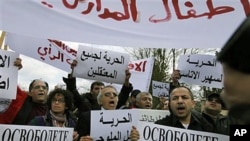A wave of anti-government protests has swept through several cities in Syria in recent weeks, with demonstrators calling for political reform and an end to the country’s 48-year state of emergency. Syrian security forces have dealt harshly with the protesters, at one point killing a reported 60 demonstrators in the southern city of Daraa.
Emboldened by uprisings in Tunisia and Egypt, Syrian protesters took to the streets hoping they could force President Bashar al-Assad to ease his harsh rule and enact the political reforms he had been promising for 11 years.
And after violent confrontations with in several towns, Syrians were eagerly awaiting the president’s address to the parliament this week, expecting an announcement on major reforms. Instead, Assad made no mention of reforms and warned of foreign conspirators using television and the Internet to incite violence in the country.
He said, "Our enemies are consistently and systematically working on a daily basis to target stability in Syria."
The Syrian president said the country’s enemies were using social networking websites and pan-Arabic satellite TV news channels to incite confrontations. And instead of announcing expected policy changes, he said all members of the ruling cabinet would be replaced.
Edward Djerejian is a former U.S. Ambassador to Syria. He said dismissing the Syrian cabinet is not enough to satisfy the people. Djerejian said if Assad really wants to assure stability in Syria, he will have to implement serious changes in government policies.
"The resignation of a government is a sign by President Bashar al-Assad that they are going to try to accommodate the calls for change by getting rid of the current government that obviously represents the status quo, and then follow up with broad reforms," he said. "What is important is what specific policies the president of Syria will take in order to meet the demands of the people for political, economic and social reforms.”
Djerejian said Syria has some unique problems compared to most of its Arab neighbors. Among them is the threat of sectarian strife among the country’s Sunnis, Shiites, Alawites, Kurds and significant Christian minorities. He said this issue will have to be addressed first to ensure stability.
But Ammar Abdulhamid, a Syrian human rights activist living in the United States, said it may be too late for Assad to offer any acceptable reforms.
"That is not enough anymore," he said. "The only thing that can stop the revolution is his departure. Demonstrators sort of put a list of nine demands saying: 'First of all we want end to corruption and they mention the president’s cousin by name. We want free presidential elections, free parliamentary elections, and an end to the state of emergency, release of all political prisoners.' When you go down the list, you realize these amount to regime change."
Ammar predicts especially large anti-government protests on Friday and said the protests will continue despite the government’s crackdown.
The United States has consistently urged the Syrian government to begin reforms immediately, but State Department spokesman Mark Toner said Assad’s speech this week was not encouraging.
"I think it’s clear to us that it didn’t really have much substance to it and didn’t talk about specific reforms as was suggested in the run-up to the speech," said Toner. "We understand that protests are scheduled, I believe, for Friday and, obviously, we would strongly condemn any violence against those protesters."
Robert Hunter, a former U.S. Ambassador to NATO, says Washington has increasingly less leverage, however, to use against Assad if the Syrian leader continues his harsh measures.
"It is obvious that we are not going to use force, and something like a no-fly zone would not be applicable because the [Syrian] internal security forces don't use aircraft. And who knows what will happen if the brutality continues and if there is an outcry about massive murdering of people," said Hunter.
Hunter’s cautious assessment is shared by many U.S. experts, who point out that Syria’s central role in the search for Middle East peace makes it an especially delicate problem for Washington policy-makers.









